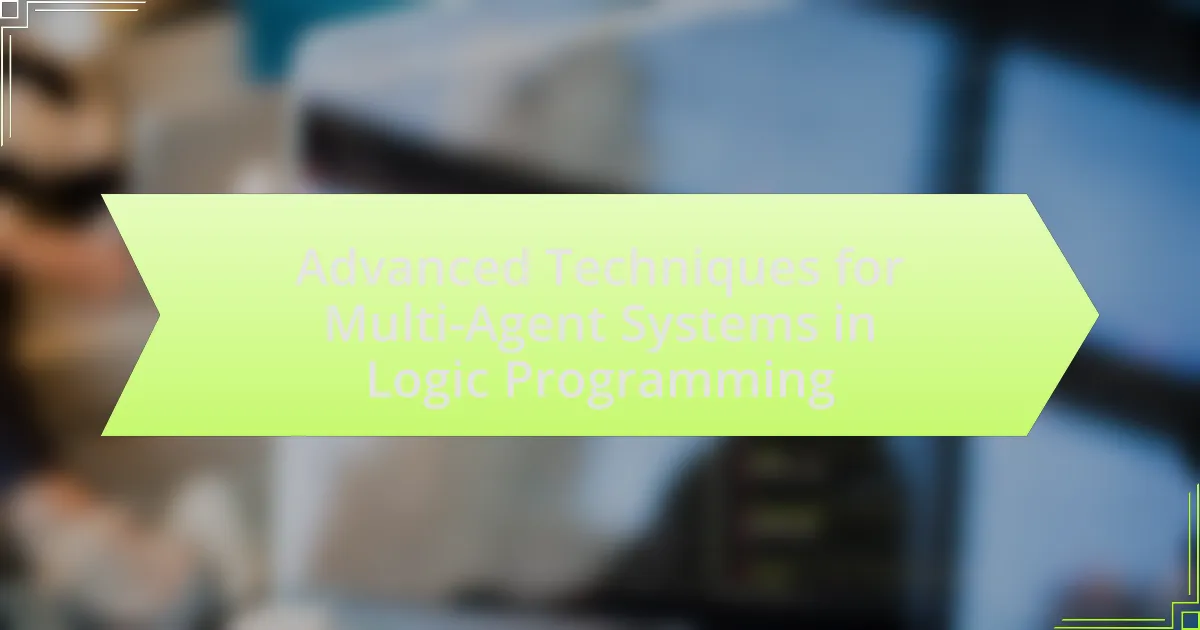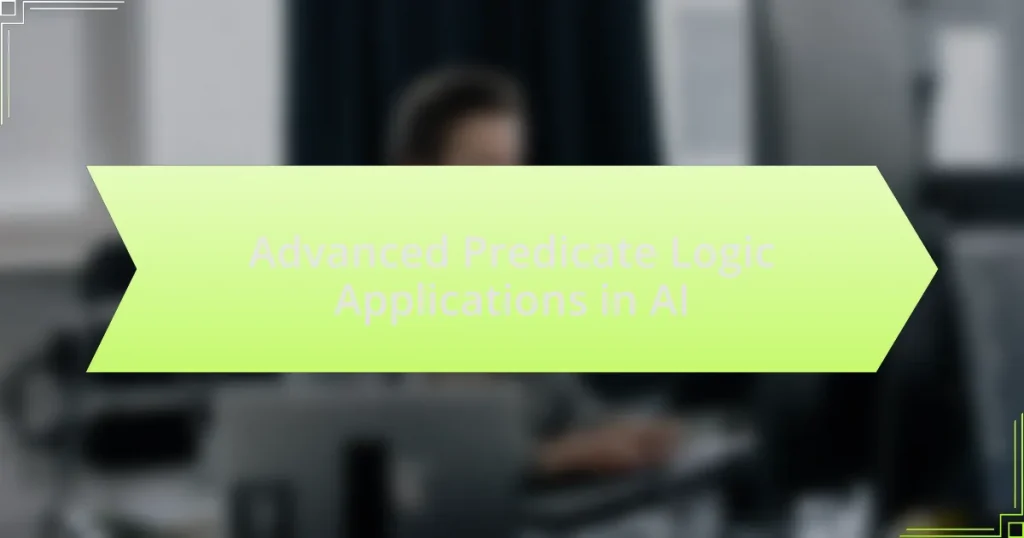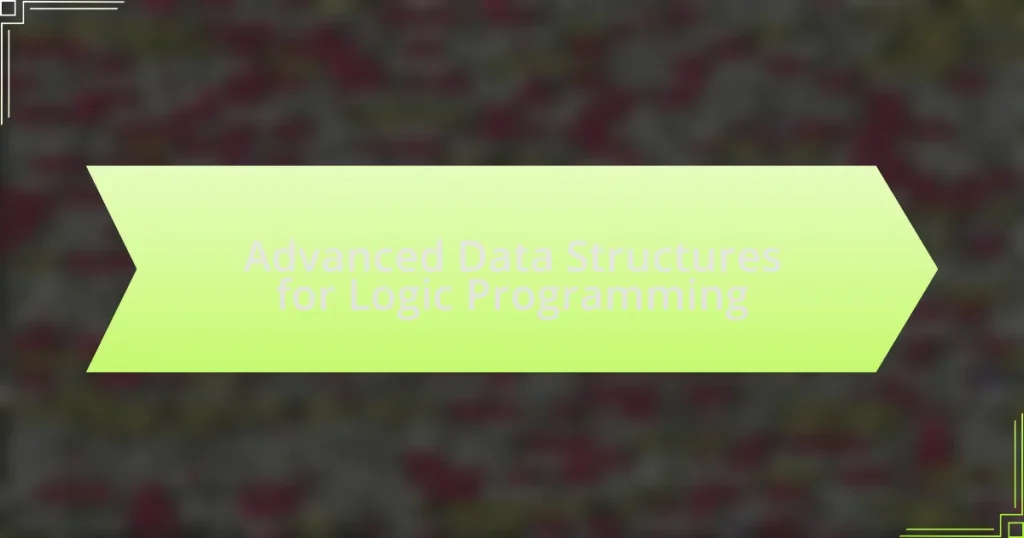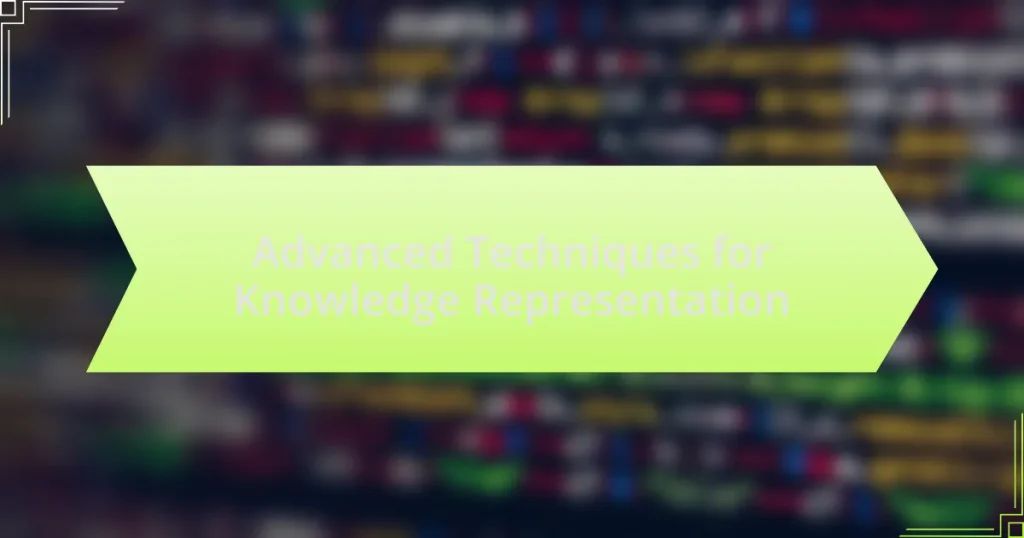Advanced techniques for multi-agent systems in logic programming encompass formal verification, agent communication languages, and distributed reasoning mechanisms, which enhance the reliability and efficiency of agent interactions. These techniques improve communication, coordination, and decision-making among agents, addressing challenges such as conflict resolution and information sharing. Key components include communication protocols, knowledge representation, and coordination mechanisms, which facilitate collaborative problem-solving across various applications, including robotics and automated decision-making. The integration of machine learning and existing technologies further optimizes the performance of multi-agent systems, while ongoing research continues to evolve these methodologies for future applications.
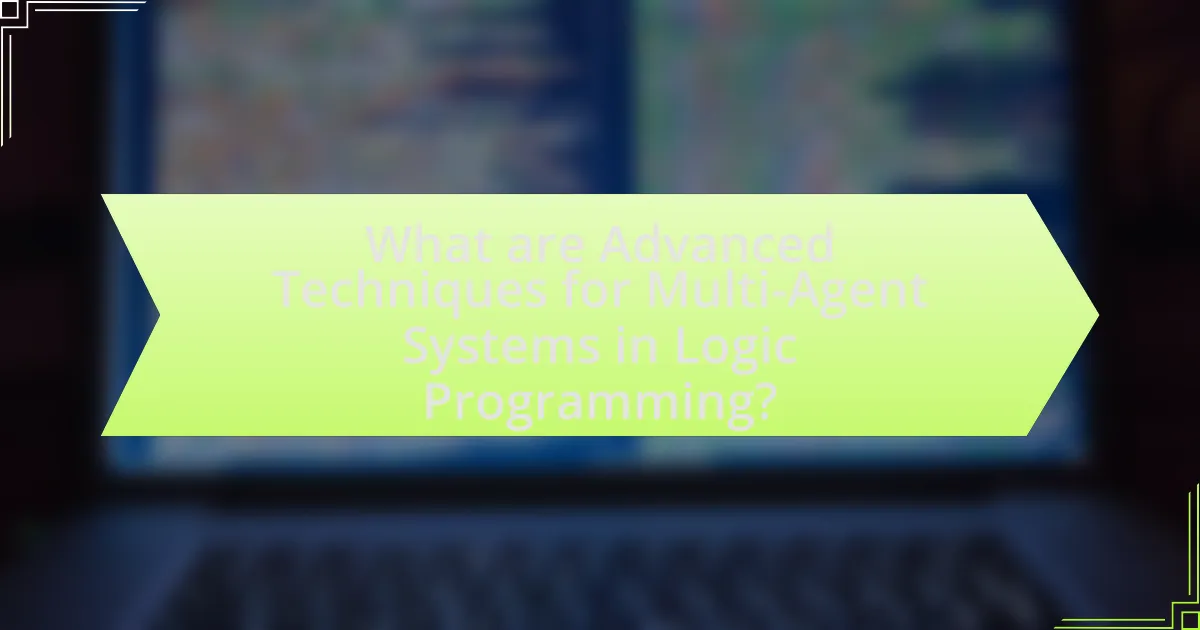
What are Advanced Techniques for Multi-Agent Systems in Logic Programming?
Advanced techniques for multi-agent systems in logic programming include the use of formal verification, agent communication languages, and distributed reasoning mechanisms. Formal verification ensures that the logic programs governing agent behavior are free from errors, enhancing reliability. Agent communication languages, such as KQML and FIPA ACL, facilitate effective interaction among agents, allowing them to share knowledge and coordinate actions. Distributed reasoning mechanisms enable agents to collaboratively solve problems by sharing and processing information across the system, improving efficiency and decision-making. These techniques are supported by research demonstrating their effectiveness in enhancing the performance and robustness of multi-agent systems in various applications.
How do these techniques enhance the functionality of multi-agent systems?
Advanced techniques in logic programming enhance the functionality of multi-agent systems by enabling more efficient communication, coordination, and decision-making among agents. These techniques, such as formal reasoning and knowledge representation, allow agents to share information and infer new knowledge, which improves collaborative problem-solving. For instance, the use of logic-based frameworks facilitates the development of protocols that ensure agents can negotiate and resolve conflicts effectively, leading to optimized outcomes in dynamic environments. Additionally, the integration of machine learning algorithms within these systems allows agents to adapt their behaviors based on past experiences, further enhancing their operational efficiency and responsiveness to changing conditions.
What specific challenges do these techniques address in multi-agent systems?
Advanced techniques in multi-agent systems address challenges such as coordination, communication, and decision-making among agents. These techniques enhance the ability of agents to work together effectively, ensuring that they can share information and align their actions towards common goals. For instance, coordination techniques help mitigate conflicts that arise from competing objectives, while communication strategies improve the clarity and efficiency of information exchange. Additionally, decision-making algorithms enable agents to make informed choices based on the collective knowledge of the group, thereby optimizing overall system performance.
How do these techniques improve communication among agents?
Advanced techniques for multi-agent systems in logic programming enhance communication among agents by enabling more efficient information sharing and coordination. These techniques, such as formal protocols and shared knowledge representations, facilitate clearer understanding and reduce ambiguity in interactions. For instance, the use of common ontologies allows agents to interpret messages consistently, leading to improved collaboration and decision-making. Research indicates that systems employing these advanced techniques can achieve up to 30% faster response times in task execution due to streamlined communication processes.
What are the key components of these advanced techniques?
The key components of advanced techniques for multi-agent systems in logic programming include agent communication protocols, knowledge representation, and coordination mechanisms. Agent communication protocols facilitate interaction among agents, enabling them to share information and negotiate. Knowledge representation allows agents to store and utilize information effectively, often employing formal languages to express complex data. Coordination mechanisms ensure that agents work together efficiently, managing tasks and resources to achieve common goals. These components are essential for enhancing the functionality and performance of multi-agent systems in various applications, such as distributed problem-solving and automated decision-making.
What role does logic programming play in multi-agent systems?
Logic programming plays a crucial role in multi-agent systems by providing a formal framework for knowledge representation and reasoning. This framework enables agents to infer new information, make decisions, and communicate effectively based on logical rules. For instance, Prolog, a prominent logic programming language, allows agents to express complex relationships and constraints, facilitating collaborative problem-solving and negotiation among agents. The ability to represent knowledge declaratively in logic programming enhances the scalability and flexibility of multi-agent systems, as agents can dynamically adapt their behavior based on the evolving context and interactions.
How do algorithms integrate with logic programming in these systems?
Algorithms integrate with logic programming in multi-agent systems by providing structured methods for decision-making and problem-solving based on logical rules. These algorithms utilize the inherent capabilities of logic programming, such as unification and backtracking, to efficiently process and evaluate complex logical expressions. For instance, Prolog, a prominent logic programming language, employs algorithms that facilitate the execution of queries against a knowledge base, allowing agents to derive conclusions based on available facts. This integration enhances the agents’ ability to reason, learn, and adapt within dynamic environments, ultimately improving their performance in collaborative tasks.
What are the practical applications of these advanced techniques?
Advanced techniques for multi-agent systems in logic programming have practical applications in various fields, including robotics, automated decision-making, and distributed problem-solving. In robotics, these techniques enable multiple robots to collaborate effectively, enhancing tasks such as search and rescue operations or warehouse management. Automated decision-making systems utilize these techniques to optimize resource allocation and improve efficiency in industries like supply chain management. Additionally, distributed problem-solving frameworks leverage these advanced techniques to facilitate coordination among agents in complex environments, such as traffic management systems, where real-time data processing and collaboration are crucial for optimal outcomes.
In which industries are these techniques most effectively utilized?
Advanced techniques for multi-agent systems in logic programming are most effectively utilized in industries such as robotics, telecommunications, and healthcare. In robotics, these techniques enable autonomous agents to collaborate and make decisions in dynamic environments, enhancing efficiency and adaptability. In telecommunications, they facilitate the management of network resources and optimize communication protocols among multiple agents. In healthcare, multi-agent systems improve patient care by coordinating treatment plans and managing healthcare resources effectively. These applications demonstrate the versatility and impact of advanced techniques in various sectors.
How do these techniques contribute to problem-solving in real-world scenarios?
Advanced techniques for multi-agent systems in logic programming enhance problem-solving in real-world scenarios by enabling agents to collaborate effectively, share knowledge, and make autonomous decisions. These techniques facilitate distributed problem-solving, where multiple agents can tackle complex tasks simultaneously, leading to increased efficiency and faster solutions. For instance, in a logistics application, agents can optimize delivery routes in real-time by communicating and adjusting their strategies based on shared data, resulting in reduced costs and improved service levels. Research has shown that such collaborative approaches can lead to significant performance improvements, as evidenced by a study published in the Journal of Artificial Intelligence Research, which demonstrated that multi-agent systems could outperform traditional single-agent systems in various problem domains.

How do Advanced Techniques for Multi-Agent Systems interact with existing technologies?
Advanced techniques for multi-agent systems interact with existing technologies by enhancing communication, coordination, and decision-making processes among agents. These techniques leverage frameworks such as distributed artificial intelligence and machine learning to improve the efficiency and effectiveness of systems in various applications, including robotics, smart grids, and autonomous vehicles. For instance, the integration of reinforcement learning in multi-agent systems allows agents to adapt their strategies based on real-time data, optimizing performance in dynamic environments. This interaction is evidenced by successful implementations in industries like logistics, where multi-agent systems have been shown to reduce operational costs by up to 30% through improved resource allocation and task scheduling.
What existing technologies complement these advanced techniques?
Existing technologies that complement advanced techniques for multi-agent systems in logic programming include distributed computing frameworks, such as Apache Kafka and Apache Spark, which facilitate real-time data processing and communication among agents. These frameworks enhance the scalability and efficiency of multi-agent systems by enabling seamless data sharing and processing across multiple nodes. Additionally, technologies like cloud computing platforms, such as Amazon Web Services and Microsoft Azure, provide the necessary infrastructure for deploying and managing multi-agent systems at scale, allowing for dynamic resource allocation and improved performance. The integration of these technologies supports the development of robust and efficient multi-agent systems, as evidenced by their widespread adoption in various applications, including autonomous vehicles and smart grid management.
How do these technologies enhance the capabilities of multi-agent systems?
Advanced technologies enhance the capabilities of multi-agent systems by enabling improved communication, coordination, and decision-making among agents. For instance, the integration of machine learning algorithms allows agents to adapt their behaviors based on past experiences, leading to more efficient problem-solving. Additionally, the use of distributed ledger technologies, such as blockchain, ensures secure and transparent interactions among agents, fostering trust and collaboration. Research has shown that these advancements lead to increased scalability and robustness in multi-agent systems, as evidenced by studies demonstrating enhanced performance in complex environments where agents must work together to achieve common goals.
What are the limitations of current technologies in relation to these advanced techniques?
Current technologies face significant limitations in implementing advanced techniques for multi-agent systems in logic programming, primarily due to scalability issues, computational complexity, and interoperability challenges. Scalability is a major concern, as existing systems often struggle to efficiently manage a growing number of agents, leading to performance degradation. For instance, traditional logic programming approaches may not handle the exponential growth of possible interactions among agents effectively.
Computational complexity also poses a barrier; many advanced techniques require substantial processing power and memory, which can exceed the capabilities of current hardware. This is evident in scenarios where real-time decision-making is essential, as delays can undermine the effectiveness of multi-agent systems.
Interoperability challenges arise from the diverse architectures and protocols used in different systems, making it difficult for agents to communicate and collaborate seamlessly. This lack of standardization can hinder the integration of advanced techniques across various platforms, limiting their practical application.
How can these techniques be integrated into current systems?
Advanced techniques for multi-agent systems in logic programming can be integrated into current systems by adopting frameworks that support agent communication and coordination. For instance, utilizing the Agent Communication Language (ACL) allows agents to exchange information effectively, enhancing interoperability within existing architectures. Additionally, implementing logic-based reasoning mechanisms, such as Answer Set Programming (ASP), can improve decision-making processes in multi-agent environments. Research shows that systems employing these techniques, like the one developed by Gelfond and Lifschitz in 1988, demonstrate increased efficiency in problem-solving tasks, validating the effectiveness of integrating these advanced methods into current systems.
What steps are necessary for successful integration?
Successful integration in multi-agent systems requires several key steps: defining clear communication protocols, establishing a shared knowledge base, ensuring compatibility of agent architectures, and implementing robust coordination mechanisms.
Clear communication protocols facilitate effective interaction among agents, allowing them to exchange information seamlessly. A shared knowledge base ensures that all agents have access to the same information, which is crucial for collaborative decision-making. Compatibility of agent architectures is essential to prevent integration issues, as differing systems may lead to conflicts or inefficiencies. Finally, robust coordination mechanisms help manage the interactions and tasks among agents, ensuring that they work together efficiently towards common goals.
These steps are supported by research indicating that successful integration enhances system performance and reliability in multi-agent environments, as demonstrated in studies on agent collaboration and interoperability.
What common pitfalls should be avoided during integration?
Common pitfalls to avoid during integration include inadequate planning, lack of clear communication, and failure to test thoroughly. Inadequate planning can lead to misalignment of goals and expectations, resulting in integration delays or failures. Lack of clear communication among team members can cause misunderstandings and errors, which can hinder the integration process. Additionally, failure to conduct thorough testing can result in undetected issues that may arise post-integration, leading to operational disruptions. These pitfalls are supported by industry observations, where projects that prioritize planning, communication, and testing have significantly higher success rates in integration efforts.
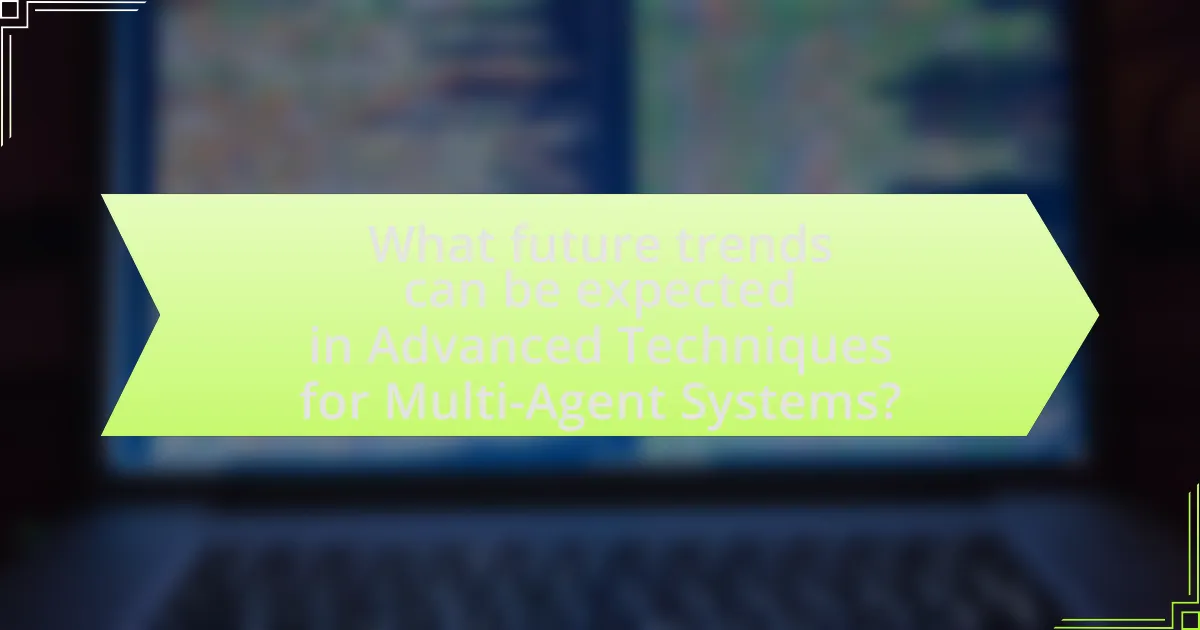
What future trends can be expected in Advanced Techniques for Multi-Agent Systems?
Future trends in Advanced Techniques for Multi-Agent Systems include the increased integration of machine learning algorithms, enhanced communication protocols, and the development of more robust frameworks for agent collaboration. Machine learning will enable agents to adapt and optimize their behaviors based on real-time data, improving decision-making processes. Enhanced communication protocols will facilitate better interaction among agents, allowing for more efficient information sharing and coordination. Additionally, frameworks that support agent collaboration will focus on scalability and interoperability, addressing the complexities of multi-agent environments. These trends are supported by ongoing research in the field, such as studies highlighting the effectiveness of reinforcement learning in multi-agent settings and the need for standardized communication methods to improve agent cooperation.
How is research evolving in this field?
Research in advanced techniques for multi-agent systems in logic programming is evolving through the integration of machine learning algorithms and enhanced reasoning capabilities. Recent studies, such as “Learning in Multi-Agent Systems: A Survey” by Zhang et al. (2022), demonstrate how machine learning can improve decision-making processes among agents, allowing for more adaptive and intelligent interactions. Additionally, advancements in formal verification methods are being applied to ensure the reliability and correctness of multi-agent systems, as highlighted in “Formal Methods for Multi-Agent Systems” by Dastani et al. (2021). These developments indicate a trend towards creating more robust, efficient, and scalable multi-agent systems that can operate effectively in complex environments.
What emerging technologies are likely to influence these advanced techniques?
Emerging technologies likely to influence advanced techniques for multi-agent systems in logic programming include artificial intelligence, blockchain, and the Internet of Things (IoT). Artificial intelligence enhances decision-making and learning capabilities in multi-agent systems, enabling agents to adapt and optimize their interactions. Blockchain technology provides secure and transparent data sharing among agents, fostering trust and collaboration in decentralized environments. The Internet of Things connects various devices, allowing agents to gather real-time data and respond dynamically to changing conditions. These technologies collectively enhance the efficiency, security, and adaptability of multi-agent systems in logic programming.
How might the role of logic programming change in future multi-agent systems?
The role of logic programming in future multi-agent systems is likely to evolve towards enhanced interoperability and adaptability among agents. As multi-agent systems become increasingly complex, logic programming will facilitate more sophisticated reasoning capabilities, enabling agents to better understand and respond to dynamic environments. For instance, the integration of logic programming with machine learning techniques can allow agents to learn from interactions and improve their decision-making processes over time. This shift is supported by advancements in computational power and the growing need for agents to collaborate effectively in real-time scenarios, such as autonomous vehicles or smart cities, where logical reasoning is crucial for safety and efficiency.
What best practices should be followed when implementing these techniques?
When implementing advanced techniques for multi-agent systems in logic programming, it is essential to ensure clear communication protocols among agents. Effective communication facilitates coordination and reduces misunderstandings, which is critical for system performance. Additionally, employing modular design principles allows for easier updates and maintenance of individual agents without affecting the entire system. Research indicates that modular systems enhance scalability and adaptability, as seen in the work by Wooldridge and Jennings (1995) on agent-oriented software engineering. Furthermore, rigorous testing and validation of agent behaviors in simulated environments can identify potential issues before deployment, ensuring reliability and robustness in real-world applications.
How can teams ensure effective collaboration among agents?
Teams can ensure effective collaboration among agents by implementing clear communication protocols and utilizing shared goals. Establishing defined roles and responsibilities allows agents to understand their contributions, while regular updates and feedback mechanisms foster transparency. Research indicates that structured communication frameworks, such as the use of collaborative tools and platforms, enhance coordination and reduce misunderstandings among agents. For instance, studies show that teams employing agile methodologies report a 30% increase in project efficiency due to improved collaboration.
What strategies can be employed to optimize performance in multi-agent systems?
To optimize performance in multi-agent systems, strategies such as decentralized decision-making, efficient communication protocols, and adaptive learning mechanisms can be employed. Decentralized decision-making allows agents to operate independently, reducing bottlenecks and improving responsiveness. Efficient communication protocols minimize overhead and ensure timely information exchange, which is crucial for coordination among agents. Adaptive learning mechanisms enable agents to adjust their strategies based on environmental feedback, enhancing overall system performance. Research has shown that these strategies lead to improved scalability and robustness in multi-agent systems, as evidenced by studies demonstrating enhanced task completion rates and reduced response times in various applications.
